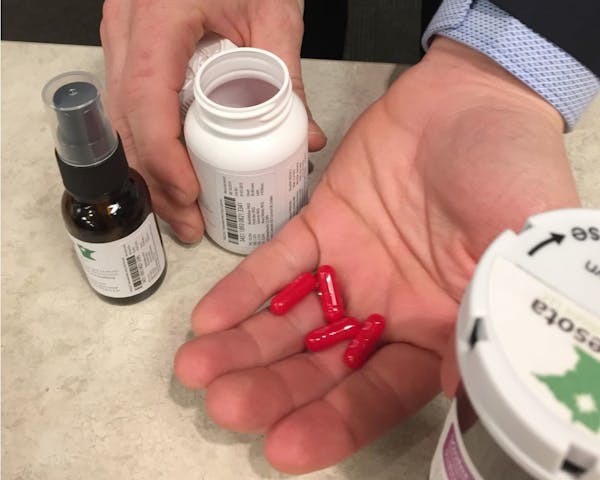Katelyn Faith Pauling, who helped change Minnesota's marijuana laws, died Friday, just months before the drug that might have eased her seizure disorder becomes legal.
She was 8 years old.
"She did a lot while she was here," said her father, Jeremy Pauling, who spent much of last year traveling from the family home in Montevideo, Minn., to St. Paul, where he and his wife lobbied lawmakers to legalize medical marijuana, with Katelyn beside them in her wheelchair.
Cannabis oil can be used to treat children with seizure disorders in almost half the states in the country now — in some cases reducing their seizures from hundreds a day to almost zero. After months of lobbying by families like the Paulings, Minnesota lawmakers passed a limited marijuana legalization bill that goes into effect in July.
"Bringing her [to the Capitol] and letting people hear her story changed a lot of people's minds and is going to help a lot of people," Pauling said. "If my little girl can do that to help somebody else's little girl or boy, I'm happy. It makes me feel better inside."
Katelyn was the youngest of the three Pauling daughters. Her sisters, Kaylee, 12, and Kassey, 11, wrote her obituary. Their story celebrates the memory of the bouncy little girl she used to be — a happy child who loved sparkly outfits and ponies and taking flying leaps off the top bunk of the bunk bed.
That little girl's life was stolen away, bit by bit, by Batten disease, a rare, fatal neurological condition that triggered severe seizures that gradually put Katelyn in a wheelchair and robbed her of the ability to speak.
"She started out as a happy, healthy little girl, until the age of 3, when she started having seizures," said Pauling, who serves on the governor's Task Force on Medical Cannabis Therapeutic Research, representing the parents of young patients. "She was running and jumping and playing with her sisters. When the disease took over, it took her away from us."
Her sisters remembered her as a little girl whose face would light up every time they visited the family farm. Watching Katelyn smile "was the best thing ever," Kaylee wrote.
Things that made Katelyn smile included school, when she was feeling well enough; riding her pony, Baby; camping; boat rides; and most of all, her family and the wide circle of friends who rallied to support the Paulings.
Montevideo voted to invite a medical cannabis clinic to set up shop in the city of 5,000, so the family wouldn't have to drive hours to dispensaries in Minneapolis or St. Cloud. So far, none of the sites chosen for the state's eight medical marijuana distribution centers has been anywhere near the southwestern part of the state.
The family has established a fund in Katelyn's name to benefit research into Batten disease. Memorial contributions can be made to the Katelyn Faith fund at Midwest Bank or at BDSRA.org.
"We've gotten a lot of support from all over the state of Minnesota," Pauling said. "It helps us heal a little bit."
Medical marijuana was a legislative long shot last year. Katelyn Pauling, and other patients like her, helped put a human face on the debate.
"The willingness of families to step forward and share their stories and their pain and their struggle, it's very, very powerful. There's really no substitute," said Sen. Scott Dibble, DFL-Minneapolis, author of the Senate version of the medical marijuana bill. Katelyn and her "beautiful, strong, loving family who surrounded her," left a strong impression.
In her short life, Katelyn Faith Pauling left a legacy larger than some leave in an full lifetime.
"She did more than a lot of people I know to help other people," Jeremy Pauling said. "She was here for a reason. I think she fulfilled her reason and she said, 'Dad, I'm done fighting. I don't want to hurt no more.' "
Katelyn's funeral is planned for Wednesday morning at Our Savior's Lutheran Church in Montevideo. Burial will follow at St. John's Lutheran Cemetery.
Medical marijuana will be legal in Minnesota on July 1. The first two dispensaries will open in Minneapolis and Eagan, with six more distribution sites set to open in the following weeks or months. The drug will only be legal in pill or liquid form and only for patients with certain medical conditions, although the State Health Department is evaluating whether to expand the program to cover other conditions, like intractable pain.
Jennifer Brooks • 612-673-4008
'A Year With Frog and Toad' closes a chapter at CTC

Ambi Subramaniam and Kaushiki Chakraborty to Minnesotans: Lean in on Indian classical music, it's fun
Meet the man setting a new standard for cool vibraphone music in Minnesota

